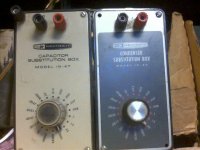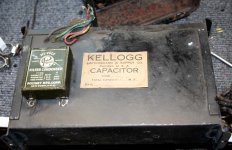Tom and others, the lower case applies only to the common noun, not the abbreviation or symbol. Confusing? Can be.
That's not what I meant.
One volt is 1.0 V not 1.0 v.
Tom
Regarding jean-paul's post above, I thought there was a rule for 1.5V denoting a dc voltage, and 1.5v denoting an ac voltage. Or something like that.
I forget who it was that said, "The good thing about standards is there's so many of them."
I forget who it was that said, "The good thing about standards is there's so many of them."
Regarding jean-paul's post above, I thought there was a rule for 1.5V denoting a dc voltage, and 1.5v denoting an ac voltage. Or something like that.
I forget who it was that said, "The good thing about standards is there's so many of them."
I vaguely remember that for certain units, stringent people used lower case for instantaneous values, caps for average values.
Thus is the perfect discussion to help me figure out resistance as it relates to intrinsic device curves. V=I xR, we can agree on, which is the same as defining resistance as R = V / I. But would it be more accurate or useful or correct to say R = dV/dI (calculus derivative)?
I think the quote you're looking for is a grouchy Marx one:
Those are my principles, and if you don't like them... well, I have others
That's a convention for symbols for quantities, not for unit symbols.
So when v(t) = 3 V + 1 V sin(2 pi f t), then VDC = 3 V, where pi should be a Greek letter, but I never figured out how to post those.
So when v(t) = 3 V + 1 V sin(2 pi f t), then VDC = 3 V, where pi should be a Greek letter, but I never figured out how to post those.
Last edited:
I've actually had to rise from my seat to get my headphones!
"A green worm pours a glass towards a glassmaker around eight o'clock."
"Un ver vert verse un verre vers un verrier vers vingt heures."
For those not familiar with the French language, the pronunciation of most of the words in this odd phrase sounds exactly the same.
No wonder I never understood French! 😕
Nothing wrong with this sentence [emoji41]
I once cooked both my an my russian friend’s brain-cell with a „competition“: the sentence with more occurrences of the words [hare, hair, heir, here] won.
I won:
Here’s the hairy heirs hares hairs (and then some which I forgot)…
Prize was a drawing.

I vaguely remember that for certain units, stringent people used lower case for instantaneous values, caps for average values.
I got my training at a Philips Evening School and learned that 1V is DC, 1v is AC.
@ JP: English, German, not english, german. Even my auto-corrector knows it ;-)
Jan
Sorry. Mix up of languages makes for errors. Well your posts are not entirely free of that either 🙂
Have a nice day!
BTW when I think of it... writing 1V for DC and 1v for AC... that means your education was more than 50 years ago!
Have a nice day!
BTW when I think of it... writing 1V for DC and 1v for AC... that means your education was more than 50 years ago!
Last edited:
At least horsepower is always lowercase (hp), and it's somewhere between 9,812.5W and 935W 😀
Horsepower - Wikipedia
Brian
Horsepower - Wikipedia
Brian
At least horsepower is always lowercase (hp), and it's somewhere between 9,812.5W and 935W 😀
oh - thanks for introducing the decimal/digit group issue!
9,812.5 W or
9.812,5 W or
9 812.5 W ...
Depends where you live…
If you work on digital files, I think it’s best to write the numbers without denominations (100000.0) and let the software/computer do the rest—assuming it is properly configured.
If you work on digital files, I think it’s best to write the numbers without denominations (100000.0) and let the software/computer do the rest—assuming it is properly configured.
Last edited:
Not a trick question (because I don't know the answer)
Why did "capacitor" eventually supersede "condenser" ?
And why did they similarly change to μF from mfd ?
Why did "capacitor" eventually supersede "condenser" ?
And why did they similarly change to μF from mfd ?
No idea, in Dutch it's still a condensator and the microphones are still condenser microphones.
The name was under consideration for change as far back as the 1930s. In another thread I read of a "Radio Physics Course" book from 1933 in which the term capacitor is described as having been "lately adopted" due to it being a better description of a device used to introduce capacitance into an electrical circuit.
Attachments
I also read that "condenser" seems to have faded from use from the mid 1930s through about 1950. Dubilier was using capacitor by 1940 but Allied catalogs didn't switch to capacitor until around 1950.
My uncle worked for TCC (Telegraph Condenser Company) in Bathgate in the 1960s and gave me a tour of the factory. I remember a vast hall full of winding machines spinning rolls of aluminium foil and waxed paper!
My uncle worked for TCC (Telegraph Condenser Company) in Bathgate in the 1960s and gave me a tour of the factory. I remember a vast hall full of winding machines spinning rolls of aluminium foil and waxed paper!
Telegraph Condenser Co.Limited opened at Whiteside in 1947 - known to all as the TCC- in 1965 it was taken over by Plessey and became Plessey Capacitors Ltd. In December 1981
That brings us back to the problem with abbreviations again.And why did they similarly change to μF from mfd ?
mfd could stand for milliFarad! 😱
Old capacitors were marked MFD as it was easier to print than μF.
I thought that mfd was used for all "condenser" values
e.g. 0.001 mfd, 10 mfd, 1000 mfd and even (I guess) 10,000 mfd ?
e.g. 0.001 mfd, 10 mfd, 1000 mfd and even (I guess) 10,000 mfd ?
No idea, in Dutch it's still a condensator
Using Google translate
English to German - capacitor --> Kondensator
English to Spanish - capacitor --> condensador
English to Russian - capacitor --> конденсатор (kondensator)
English to Greek - capacitor --> πυκνωτής (pyknotís)
I also read that "condenser" seems to have faded from use from the mid 1930s through about 1950. Dubilier was using capacitor by 1940 but Allied catalogs didn't switch to capacitor until around 1950.
My uncle worked for TCC (Telegraph Condenser Company) in Bathgate in the 1960s and gave me a tour of the factory. I remember a vast hall full of winding machines spinning rolls of aluminium foil and waxed paper!
Here are two capacitors out of a 1928 Zenith model 39A.
A 1 MFD condenser from the radio, and the main capacitor filter block out of the power supply.
(Photo courtesy of azenithnut over on Antique Radio)
I find history stuff like this honestly fascinating
- Home
- General Interest
- Everything Else
- Those pesky Abbreviations!

